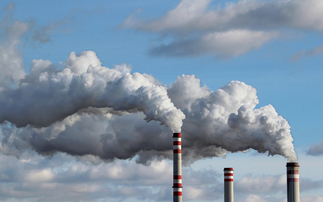Government sources predict current national emission reduction pledges will put world on path to 2.5C warming
The world is set to exceed the internationally agreed 2C of warming target regarded as the threshold for avoiding dangerous levels of climate change despite a plethora of national pledges to reduce greenhouse gas emissions, UK government sources have admitted.
Ahead of crunch climate change talks in Paris at the end of this year, 60 countries responsible for 62 per cent of global greenhouse gas emissions have submitted their reduction pledges, known as intended nationally determined contributions (INDCs) to the United Nations.
A number of emerging economies have yet to submit, including Brazil, India and Indonesia, but they are expected to file by the 1 October deadline, at which point national climate action plans should cover around 85 per cent of the world's emissions.
The system of INDCs is designed to break the long-running deadlock at the UN climate talks by providing a system of voluntary policy commitments that could form the basis of a new international climate treaty. Diplomats maintain the approach will provide a clear signal to businesses that the world is committed to decarbonising and as such will help mobilise increased investment in clean technologies and low carbon infrastructure.
But diplomats have also warned that the current pledges will not be enough to deliver the 2C target that countries agreed would be required to prevent catastrophic climate change.
UK government sources are now predicting the pledges would still see global emissions rising to around 56 gigatonnes by 2030, putting the world on a warming path to around 2.5C this century.
The United Nations Gap Report last year projected that in order to have just half a chance of meeting the 2C goal, emissions should rise no more than 42 to 47GT by 2030, meaning the current pledges still leave a major gap that will need to be bridged if the 2C target is to be met.
However, government sources admitted there were still "huge uncertainties" over the level of cuts that countries would deliver before and after Paris, as well as the environmental impacts that will result if the world passes the 2C threshold.
The UK and a number of other nations are hoping to insert a clause into the Paris agreement that would ensure countries review their greenhouse gas reduction targets every five years. Sources said this now looked increasingly likely as China and India appeared to be softening their opposition to such a review mechanism being included.
Separately, Christiana Figueres, the head of the United Nations climate change secretariat, predicted the current INDCs would lead to around 3C of warming this century. According to Reuters, she insisted the INDCs were not the magic route to 2 degrees. "What the INDCs will do is mark a very substantial departure from business as usual," she said. "Is three degrees acceptable? No."
The United Nations has said it will add up the pledges by the start of October and issue a report on their potential impact by 1 November.
This article is part of BusinessGreen's Road to Paris hub, hosted in association with PwC








